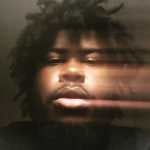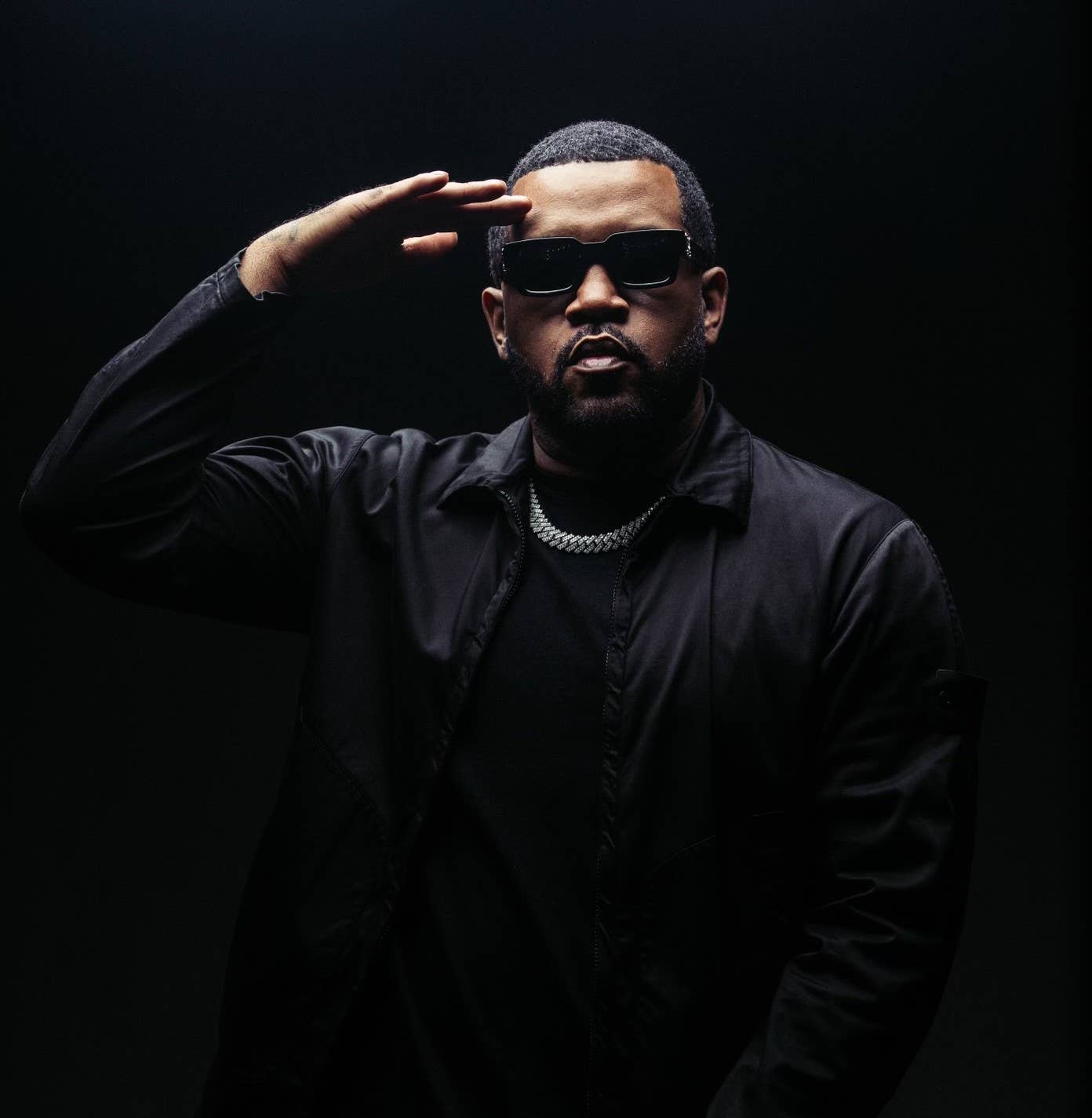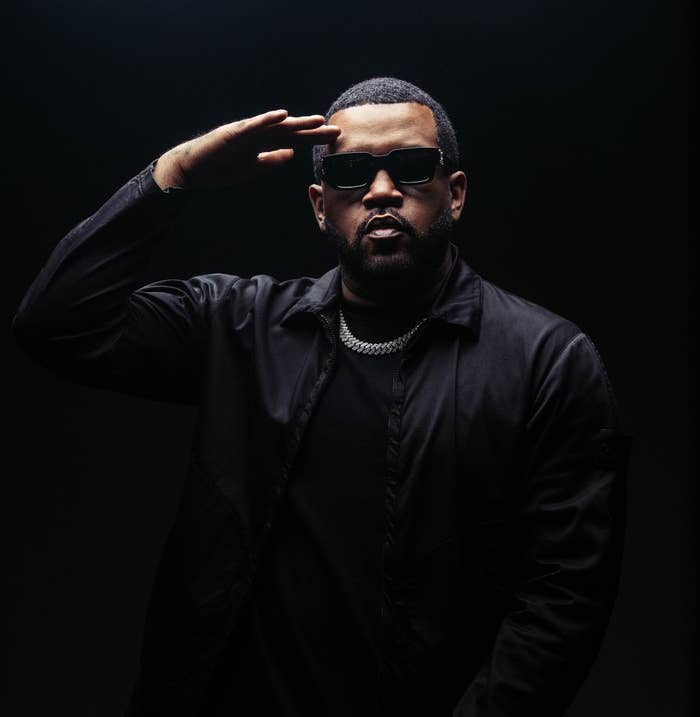
On a muggy July day in midtown Manhattan, I arrive at Sei Less, an Asian Fusion restaurant that’s a hotspot for hip-hop artists. Two hulking men are commandeering the front of the restaurant when I walk in, and I assume they’re bouncers at first, but it turns out they’re working security for a veteran New York rapper who happens to be filming a music video at the same time I’m supposed to interview Lloyd Banks.
Sei Less co-owner Dara Mirjahangiry comes to get me and takes me to the back of the restaurant, where Banks’ manager Hovain and his publicists await his arrival. The scene reminds me of the MTV special All Eyez On 50 Cent: The Sequel, where Sway interviewed 50 Cent at Sparks Steakhouse. That was in 2005, at the pinnacle of G-Unit mania. 50 was looking to top his massive debut Get Rich Or Die Tryin with The Massacre and Banks had just gone platinum with Hunger For More. The Unit seemed like an unstoppable tanker set to collectively steamroll up the charts for years to come. But 17 years later, G-Unit members are all carving their own paths.
When we meet, the 40-year-old rapper is preparing to release The Course of the Inevitable 2, a 14-track confessional that follows his 2021 album The Course of the Inevitable. He recorded the project in just four studio sessions, and crafted it by retracing the steps he took when he wrote his very first raps in a small South Jamaica bedroom. Throughout the process, he watched old shows like Martin and movies like Do The Right Thing, which served “as wallpaper” that immersed him in a nostalgic headspace. “I can’t get my room back, but I could get things that remind me of my room,” he says. “I’d just have Martin running and shit, real low. It just seems to make me comfortable.”
The album feels more like intimate musings of a journal than big swings at pop success and punchline virality. On the insular “No Reward,” Banks reflects, “Your blood, sweat and tears form a puddle before they really love you,” over sparse and frigid production from Cartune. “Dead Roses” is an indictment of fake friends, where he contends, “They don’t give a shit about you ‘til you on the front page.” Later, he appraises the fruitless cost of keeping up with the Joneses on “On My Way,” lamenting having “a quarter million in uncomfortable shoes.”
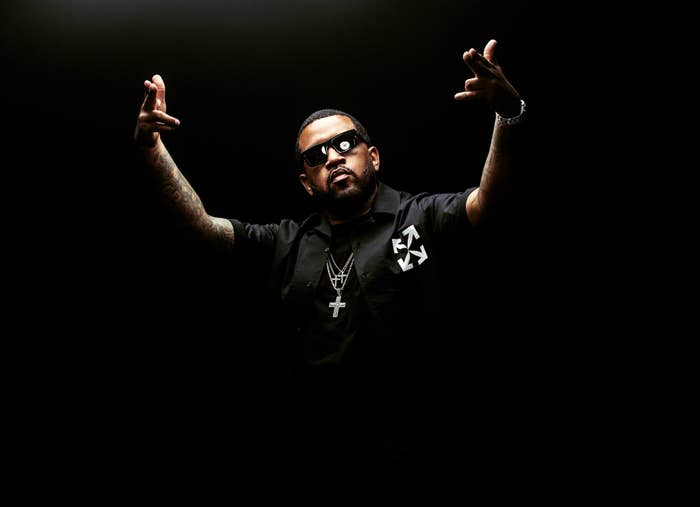
The project represents an honest look at where Banks is in his career right now, having been through the wringer of platinum success, learning how much fakery he subjected himself to as a star, and spreading wisdom that indicates he’ll never be fooled again. For Banks, longevity isn’t attrition, but an exercise in combining a rapid-fire flow with melodic cadences and laser-sharp technical prowess. The project reaffirms his place as one of rap’s most skilled lyricists.
Calling Banks a top lyricist was no big deal when 50 Cent was excitedly ad-libbing his punchlines during radio freestyles and Kanye West called him a top 5 rapper. Banks’ pen has only sharpened since that time, but his sales haven’t paralleled that artistic growth, which affects how he’s viewed by rap fans who conflate metrics with artistic merit. There are YouTube videos titled “How Lloyd Banks Sabotaged His Career,” with comments like “Banks is a perfect example of what could of been.” (Apparently, if an artist isn’t constantly chasing the spotlight, they must be sabotaging themselves.) Some rappers vie to keep a stranglehold on the charts with every project, but as Banks tells me, he’s just fine running his own race. That laser focus is reflected in the title of the new project.
“[The Course of the Inevitable] comes from determination, and all of the things that I had in me before my first record deal,” he calmly explains, arms folded on the dinner table. “When you don’t know what to do next, you’ve got to go backwards and remember what you’re doing it for. You’ve got to remember what it felt like before you made any type of money. Then you reflect on where you were at the time—the obstacles, the trials, and tribulations. What I realized is consistency is the key to all success. Whatever you do consistently, it’s going to heighten your chances to end up on that path. If you consistently do the same thing, you’re going to get the same results. So that’s a part of my growth as well. The Course of the Inevitable was just me speaking to my fan base saying, ‘We want a smooth ride,’ but that’s not life.”
“I’m too conscious of a lot of things that’s going on around me now to just stick to that and get oohs and aahs. I’m trying to get your respect, trying to get love in a certain sense.”
Banks can speak firsthand to life’s bumpy ride. Most rap fans are well aware of 50 Cent surviving nine shots and making it to the top of the charts, but it’s less known that Banks was also shot during G-Unit’s early days. After being shot in the back after a club let out in South Jamaica, Queens, the then-20-year-old ran from Jamaica Avenue to Mary Immaculate Hospital, telling himself, “Yo, I can’t die. I ain’t even sign my contract. I didn’t even make it yet,” as he recalls. “I ran to the hospital, a 20-block radius, just willing myself, ‘Nah, not right now.’” In the flash of a gun, he went from trying to “make it” as a rap star, to simply trying to “make it” and stay alive, a predicament that forever colors the perspective he has on his rap career.
“Some people will be like, ‘Oh, I think Banks should have been this or been bigger or had a different type of career,’” he says. “But I don’t look at it like that. I look at it like, I got shot right before I signed my first contract. It could have been over for me right then and there.” His words are especially poignant right now, with young rappers dying way too often. Banks could’ve been one of them, instead of a 40-year-old with two kids and life experience that’s inspired him to be more introspective in order to relate to listeners.
These days, he feels “trapped in between two different artists,” explaining, “I’ve had extreme success as an underground artist in the very beginning of the mixtape market. I won mixtape artist of the year and was highly respected in that field, but I’ve also had commercial success.” He knows he has fans who want the Punchline King, but he’s personally interested in “making music that’s powerful and is going to stick with you and be the soundtrack to that time in your life.” His words reflect that of an ambitious lyricist in the liminal space between fan appeasement and self-fulfillment.
“[My relationship with 50] is the same as it is with Tony Yayo. We brothers. We came into this shit together. We made history.”
“Some fans want you to give them that high they got when they were 19, 20 years old,” he points out. “The problem is, as an artist, if I stay at that point, I’m not going to grow. The punch lines, the necessary ignorance that it took for me to have that delivery, I’m too conscious of a lot of things that’s going on around me now to just stick to that and get oohs and aahs. I’m trying to get your respect, trying to get love in a certain sense. I’m trying to get all of those things and I’m aiming for legacy.”
He says he’s not uninterested (or incapable) of seeking mass appeal, but he’s focused on staying on theme with his recent output. “When the Beamer, Benz or Bentley comes out, they’re looking for those lighter, easy-on-the-ears, have a good time type of vibes. And I do that as well. But when I’m in theme, I stick to that theme,” he says. “So if it’s a Halloween Havoc, I’m in a dark space. If it’s All Or Nothing, I’m not really trying to pitch towards the radio or anything like that.”
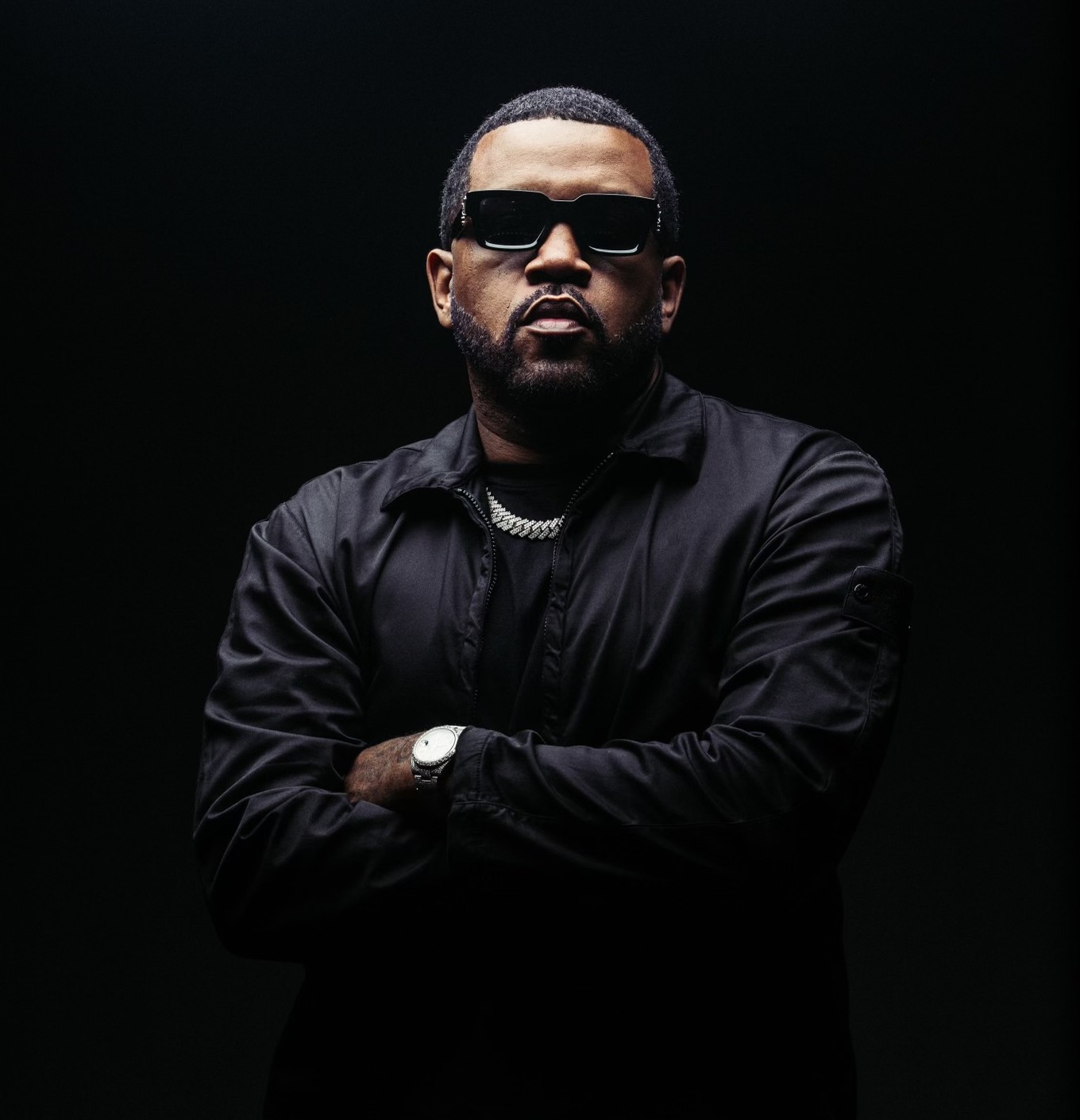
Banks says he’s working on five projects at the moment, which he’s putting together during recording sessions where he decides which songs will go on which project. He wouldn’t reveal what will differentiate those five projects musically or thematically, but he says he’s crafting sequels to his existing catalog.
“I don’t want to say too much, because then I’ll be giving away what I’m actually working on,” he contends. “But I put in a lot of work over the years, so my core fans understand what I’m talking about. Everything I’m doing now is a part two, three, four, five. And that’s what I was trying to recreate with The Course of the Inevitable. But this is part two. So who knows? Maybe next year this time it’d be a part three. Halloween Havoc, it could be part four. All Or Nothing, it’d be part three. Cold Corner would be part three. People forget the work you put in, but all you’ve got to do is look at the discography. Whether you caught it or not, go back and listen to it now and get up to speed.”
While 2021’s COTI was his first studio album since 2010’s Hunger For More 2, he did release seven mixtapes over the 2010s. Even with that reasonable cadence, he says that there’s a perception among some of his fans that he wasn’t making music. “I bump into people sometimes, and they’ll be like, ‘Yo, when you putting something new out?’ And I’ll be like, ‘Yo dog, my shit just came out two weeks ago,’” he reflects. “But they might not be tapped into The Cold Corner pocket or Halloween Havoc or All Or Nothing. They might just be on Spotify or on Hot 97 or whatever it is.”
“I’m not done. I’m not ready to celebrate what I’ve done. I’m still doing it.”
His output came into question last year when 50 Cent surmised that Banks “wanted things to come to him, as opposed to going out and getting them for himself” in his Hustle Harder, Hustle Smarter book. 50 went on to say, “That’s not me trying to assassinate his character—the guy has ‘Lazy Lloyd’ tattooed on his arm. He literally wears his laziness on his sleeve.” The hip-hop blogosphere speculated that Banks’ lyrics, “Your favorite’s nowhere near me when I’m dedicated/Always humble, usually disciplined and never hated/Call me quiet, call me lazy, talent never faded” on COTI’s “Stranger Things” were a clap back to 50, but he tells me that wasn’t the case.
“It wasn’t a response to him or anybody—it was just the consensus,” he says. “I actually played that record for him [as well as] that whole project,” like he did with COTI2. “[My relationship with 50] is the same as it is with Tony Yayo. We brothers,” he affirms. “We came into this shit together. We made history. As far as communication, that’s not the same as it used to be, but there were times where it wasn’t like that in the last 15 years. That’s my guy, man. He has me in his best interests, and the last conversation we had was just to go out and get the money. I’ve taken breaks. Go clean the plate. Go get what’s left out there. Because my mind is still on fulfilling what I want to do in music.”
Those breaks were a result of close family loss that Banks says “made me resent the work that I actually put in.” Banks lost his father in the mid-2000s, his grandmother in 2017, and he’s previously said his best friend was killed. “When things happened, you look back like, ‘Damn, maybe I should have found more time within my schedule to cater to my friends and my family.’ But then you go through other moments where you realize if you didn’t work that hard, you wouldn’t have had the opportunities to help them the way you did.”
Along with the pain of losing his loved ones, Banks says both his father and grandmother’s passings imbued him with lessons on how precious life is. “When I would go see [my grandmother], she would sometimes say, ‘Why don’t you come see me more? You don’t love me?’ I’m like, ‘Of course. What do you mean?’ But it was really hurting me to be there and see her like that. She knew she didn’t have much time. Nothing hits you like that and reminds you of that until you have kids of your own. Then you can understand, ‘I want to be present as much as possible and get everything out of this thing we call life.’ Before my other grandmother passed, she became afraid. And I used to be like, ‘Grandma, why are you afraid?’ When you live to be 88, 89, you just assume, not that you’re ready to go, but you lived a full life. But what does that really mean? Are you really ever ready to go?”
Banks suggests his father’s passing is so gut-wrenching because they didn’t cultivate the relationship they could have. He speaks theoretically about someone’s relationship with their father, perhaps because it’s still too painful to admit that it’s his reality.
“We fool ourselves and think we have time,” he says. “So if you have a relationship with somebody, like your dad or whoever, and it might be rocky, you have that audacity as a child to feel like if they’ve done you wrong, you’re going to make them warm back up to you and prove themselves. But the key part of that, that you’re leaving out, is you don’t dictate life. You roll with the punches. So if you’re saying, ‘If we are cool by this time next year, I’ll spend more time,’ what happens if you never get that opportunity? That’s God just reminding you that when man plans, God laughs.”
Banks references 34, the age he had his daughter Christina Ryann Lloyde, as a demarcation point in his life. Fatherhood has made him reprioritize things. He hasn’t smoked weed in six years, just “to be as sober minded as possible” for his kids. And while some artists covet hits, Banks has had enough of them, and is mature enough to acknowledge their ramifications on family life. “I felt the need to stick around to the point where they know daddy for real,” he says. “Because a hit record is a scary thing, man. It’s a beautiful thing. It’s a high to have a record that resonates like that and feel the response from it. But it also forces and speeds up any process you thought you were going to do. Like Mike Tyson said, ‘everybody’s got a plan until they get hit.’ Everybody has a plan until they get a hit. Once you get that hit, you have to do the interviews, you have to shoot the video, you have to go on the road and promote.”
When many people think of growth in rap, it’s in terms of commercial ascendance or financial success. But for Banks, growth isn’t about numbers. It’s about how his life experience has bolstered his artistry. He and G-Unit were supernovas, but thankfully they didn’t flame out and meet the violent fate of some of their lyrics. The gunslingers were able to look back and ponder on their paths. Rap fans are conditioned to glorify martyrdom, but it’s time to better identify with the notion of cherishing life.
What happens when youthful bravado and recklessness gives way to the reflections and responsibilities of mature adulthood? What happens when you realize that if violent loss is considered par for the course, it’s time for a new path? What happens when you rode the industry fast track to multi-platinum success, but now you want to get off and make music at your pace? In those cases, you may parallel Lloyd Banks, who’s too thankful about where his life is to be concerned about chasing anyone else’s definition of success.
“We set low standards for ourselves, or high standards in a compact time,” he reflects. “‘I gotta get rich before I die or see some shit.’ Because your window for yourself and your life expectancy is 21, and these artists are dying before they even get a chance to really feel the love. I felt the love. When my first album came out, I felt the love, but it wasn’t the same as it is now. Because it’s people who lived with my music for 15, 20 years and they see you, and they don’t give you a dap, they give you a hug. It’s like, ‘Yo, I love you.’ It’s a different type of thing. When my shows are over, I’m saying, ‘Yo, get home safe.’ I’m aware enough to know you’ve got children now. Some of you all made babies to my albums. Make it home to your family, that’s the goal. The most important part about moving is making it in and making it out. Make it back home. We came here to get back home.”
These days, Banks is focused on music, but he’s also exploring other endeavors like a podcast that he says is “real close to production.” He’s also embracing his inclination for visual art (he tells me he drew up the idea for the G-Unit spinner) by branding himself with merch featuring logos that he says have become his “bat symbol.” Eventually, he plans to draw one of his album covers. Along with art, he says he has “some plans” for a venture involving his love for cooking, noting that he has a slew of recipes that he learned from his late grandmother.
When it comes to rap, the five projects he’s working on take precedence over everything else. When I ask about following Cassidy and Canibus to the battle rap arena, he says “if the time is right and the amount is right,” adding, “I don’t want to disrespect the art,” and noting that he’s currently too focused on his music to seriously consider taking a battle. “In the meantime, I just watch it and love it,” he says. “But I know I’m dangerous. My name wouldn’t come up if they didn’t see the potential.”
He expresses a similar sentiment about a potential Verzuz match, after both Jim Jones and Juelz Santana recently called him out for battles. “It would be doing me and my fanbase a disservice because I’m actually pushing towards something right now,” he says. “For me to get off focus and move my attention there, then my project would be pushed back. So once again, you got to stay the course. Can’t let nobody speed or slow me up. And I’m not done. I’m not ready to celebrate what I’ve done. I’m still doing it. So after I drop these next five albums on their ass, then maybe I could sit down and be comfortable and then say, ‘Hey, all right, let’s entertain something like that.’”
